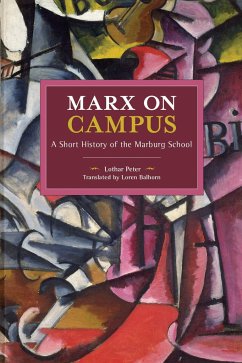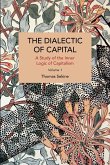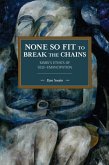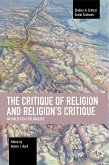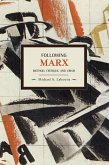- Broschiertes Buch
- Merkliste
- Auf die Merkliste
- Bewerten Bewerten
- Teilen
- Produkt teilen
- Produkterinnerung
- Produkterinnerung
Marx on Campus provides a comprehensive overview and intellectual history of one of West Germany 's most important Marxist currents, the Marburg School.
Andere Kunden interessierten sich auch für
![The Ends of Utopian Thinking in Critical Theory The Ends of Utopian Thinking in Critical Theory]() Nina RismalThe Ends of Utopian Thinking in Critical Theory25,99 €
Nina RismalThe Ends of Utopian Thinking in Critical Theory25,99 €![The Dialectics of Capital (Volume 1) The Dialectics of Capital (Volume 1)]() Thomas T SekineThe Dialectics of Capital (Volume 1)42,99 €
Thomas T SekineThe Dialectics of Capital (Volume 1)42,99 €![The Dialectics of Capital (Volume 2) The Dialectics of Capital (Volume 2)]() Thomas T SekineThe Dialectics of Capital (Volume 2)42,99 €
Thomas T SekineThe Dialectics of Capital (Volume 2)42,99 €![None So Fit to Break the Chains None So Fit to Break the Chains]() Dan SwainNone So Fit to Break the Chains37,99 €
Dan SwainNone So Fit to Break the Chains37,99 €![For Nonconformism: Max Horkheimer and Friedrich Pollock For Nonconformism: Max Horkheimer and Friedrich Pollock]() Nicola EmeryFor Nonconformism: Max Horkheimer and Friedrich Pollock31,99 €
Nicola EmeryFor Nonconformism: Max Horkheimer and Friedrich Pollock31,99 €![The Critique of Religion and Religion's Critique The Critique of Religion and Religion's Critique]() The Critique of Religion and Religion's Critique37,99 €
The Critique of Religion and Religion's Critique37,99 €![Following Marx Following Marx]() Michael A LebowitzFollowing Marx42,99 €
Michael A LebowitzFollowing Marx42,99 €-
-
-
Marx on Campus provides a comprehensive overview and intellectual history of one of West Germany 's most important Marxist currents, the Marburg School.
Hinweis: Dieser Artikel kann nur an eine deutsche Lieferadresse ausgeliefert werden.
Hinweis: Dieser Artikel kann nur an eine deutsche Lieferadresse ausgeliefert werden.
Produktdetails
- Produktdetails
- Verlag: Haymarket Books
- Seitenzahl: 184
- Erscheinungstermin: 20. Oktober 2020
- Englisch
- Abmessung: 229mm x 152mm x 11mm
- Gewicht: 272g
- ISBN-13: 9781642593365
- ISBN-10: 1642593362
- Artikelnr.: 58813445
- Herstellerkennzeichnung
- Libri GmbH
- Europaallee 1
- 36244 Bad Hersfeld
- gpsr@libri.de
- Verlag: Haymarket Books
- Seitenzahl: 184
- Erscheinungstermin: 20. Oktober 2020
- Englisch
- Abmessung: 229mm x 152mm x 11mm
- Gewicht: 272g
- ISBN-13: 9781642593365
- ISBN-10: 1642593362
- Artikelnr.: 58813445
- Herstellerkennzeichnung
- Libri GmbH
- Europaallee 1
- 36244 Bad Hersfeld
- gpsr@libri.de
Lothar Peter, Prof. Dr. phil. (1942), completed his Ph.D. at the University of Marburg under Wolfgang Abendroth and Heinz Maus. He taught sociology at the University of Bremen until 2005, and has published numerous articles and books on the subject.
Preface
Abbreviations
Introduction
Ingar Solty
1 Abendroth School or Marburg School?
1
What Constitutes a School of Thought?
2
Why the 'Marburg School '?
2 First Phase: Gradual Formation, 1950 to the Mid-1960s
1
Social and Political Context
2
Wolfgang Abendroth (1906--85)
3
Students, Doctoral Candidates, Staff
3 Second Phase: Emergence of an 'Epistemic Community ', Mid-1960s to Early
1970s
1
Social and Political Context
2
Werner Hofmann (1922--69)
3
Heinz Maus (1911--78)
4
Abendroth, Hofmann, and Maus 's Understanding of Marx and Marxism
5
The Marburg and Frankfurt Schools: 'Social Critique ' or 'Artistic Critique
'?
6
Dominance of the Marxist Paradigm
4 Third Phase: Continuity and New Challenges. Abendroth 's Retirement to
the Early 1980s
1
Social and Political Context
2
The Political Sociology of Worker Consciousness and the Trade Unions (Frank
Deppe)
3
The History of German Social Democracy (Georg Fülberth and Jürgen Harrer)
4
Studying Fascism (Reinhard Kühnl)
5
The Political Sociology of Latin America (Dieter Boris)
6
External Pressure, Administrative Interference, Difficult Encounters
7
A Controversial History of the Trade Unions
8
Theoretical Conflict: The Identity of Marxism
5 The Marburg School since the 1980s
1
A Premature Farewell
2
A Contribution to Constitutional Law (Peter Römer)
3
Marburg in the Historikerstreit (Reinhard Kühnl)
4
Activities and Interactions in the Academic Sphere
6 Fourth Phase: From the 'Epochal Rupture ' of 1989--90 to the Early 2000s
1
Social and Political Context
2
Confronting the 'Epochal Rupture ' (Georg Fülberth)
3
Reacting to a Changed Situation
4
Excursus: A Conversation between Ulrich Beck and Frank Deppe on the State
of Political Opposition in Germany
7 Scholarly Focuses since the 1990s
1
Research Activity and a New Conflict
2
Social Movements in Latin America (Dieter Boris)
3
Capitalism and Kapitalistik (Georg Fülberth)
4
Political Thought from the Late Nineteenth to the Early Twenty-First
Century (Frank Deppe)
8 Conclusion
Bibliography
Index
Abbreviations
Introduction
Ingar Solty
1 Abendroth School or Marburg School?
1
What Constitutes a School of Thought?
2
Why the 'Marburg School '?
2 First Phase: Gradual Formation, 1950 to the Mid-1960s
1
Social and Political Context
2
Wolfgang Abendroth (1906--85)
3
Students, Doctoral Candidates, Staff
3 Second Phase: Emergence of an 'Epistemic Community ', Mid-1960s to Early
1970s
1
Social and Political Context
2
Werner Hofmann (1922--69)
3
Heinz Maus (1911--78)
4
Abendroth, Hofmann, and Maus 's Understanding of Marx and Marxism
5
The Marburg and Frankfurt Schools: 'Social Critique ' or 'Artistic Critique
'?
6
Dominance of the Marxist Paradigm
4 Third Phase: Continuity and New Challenges. Abendroth 's Retirement to
the Early 1980s
1
Social and Political Context
2
The Political Sociology of Worker Consciousness and the Trade Unions (Frank
Deppe)
3
The History of German Social Democracy (Georg Fülberth and Jürgen Harrer)
4
Studying Fascism (Reinhard Kühnl)
5
The Political Sociology of Latin America (Dieter Boris)
6
External Pressure, Administrative Interference, Difficult Encounters
7
A Controversial History of the Trade Unions
8
Theoretical Conflict: The Identity of Marxism
5 The Marburg School since the 1980s
1
A Premature Farewell
2
A Contribution to Constitutional Law (Peter Römer)
3
Marburg in the Historikerstreit (Reinhard Kühnl)
4
Activities and Interactions in the Academic Sphere
6 Fourth Phase: From the 'Epochal Rupture ' of 1989--90 to the Early 2000s
1
Social and Political Context
2
Confronting the 'Epochal Rupture ' (Georg Fülberth)
3
Reacting to a Changed Situation
4
Excursus: A Conversation between Ulrich Beck and Frank Deppe on the State
of Political Opposition in Germany
7 Scholarly Focuses since the 1990s
1
Research Activity and a New Conflict
2
Social Movements in Latin America (Dieter Boris)
3
Capitalism and Kapitalistik (Georg Fülberth)
4
Political Thought from the Late Nineteenth to the Early Twenty-First
Century (Frank Deppe)
8 Conclusion
Bibliography
Index
Preface
Abbreviations
Introduction
Ingar Solty
1 Abendroth School or Marburg School?
1
What Constitutes a School of Thought?
2
Why the 'Marburg School '?
2 First Phase: Gradual Formation, 1950 to the Mid-1960s
1
Social and Political Context
2
Wolfgang Abendroth (1906--85)
3
Students, Doctoral Candidates, Staff
3 Second Phase: Emergence of an 'Epistemic Community ', Mid-1960s to Early
1970s
1
Social and Political Context
2
Werner Hofmann (1922--69)
3
Heinz Maus (1911--78)
4
Abendroth, Hofmann, and Maus 's Understanding of Marx and Marxism
5
The Marburg and Frankfurt Schools: 'Social Critique ' or 'Artistic Critique
'?
6
Dominance of the Marxist Paradigm
4 Third Phase: Continuity and New Challenges. Abendroth 's Retirement to
the Early 1980s
1
Social and Political Context
2
The Political Sociology of Worker Consciousness and the Trade Unions (Frank
Deppe)
3
The History of German Social Democracy (Georg Fülberth and Jürgen Harrer)
4
Studying Fascism (Reinhard Kühnl)
5
The Political Sociology of Latin America (Dieter Boris)
6
External Pressure, Administrative Interference, Difficult Encounters
7
A Controversial History of the Trade Unions
8
Theoretical Conflict: The Identity of Marxism
5 The Marburg School since the 1980s
1
A Premature Farewell
2
A Contribution to Constitutional Law (Peter Römer)
3
Marburg in the Historikerstreit (Reinhard Kühnl)
4
Activities and Interactions in the Academic Sphere
6 Fourth Phase: From the 'Epochal Rupture ' of 1989--90 to the Early 2000s
1
Social and Political Context
2
Confronting the 'Epochal Rupture ' (Georg Fülberth)
3
Reacting to a Changed Situation
4
Excursus: A Conversation between Ulrich Beck and Frank Deppe on the State
of Political Opposition in Germany
7 Scholarly Focuses since the 1990s
1
Research Activity and a New Conflict
2
Social Movements in Latin America (Dieter Boris)
3
Capitalism and Kapitalistik (Georg Fülberth)
4
Political Thought from the Late Nineteenth to the Early Twenty-First
Century (Frank Deppe)
8 Conclusion
Bibliography
Index
Abbreviations
Introduction
Ingar Solty
1 Abendroth School or Marburg School?
1
What Constitutes a School of Thought?
2
Why the 'Marburg School '?
2 First Phase: Gradual Formation, 1950 to the Mid-1960s
1
Social and Political Context
2
Wolfgang Abendroth (1906--85)
3
Students, Doctoral Candidates, Staff
3 Second Phase: Emergence of an 'Epistemic Community ', Mid-1960s to Early
1970s
1
Social and Political Context
2
Werner Hofmann (1922--69)
3
Heinz Maus (1911--78)
4
Abendroth, Hofmann, and Maus 's Understanding of Marx and Marxism
5
The Marburg and Frankfurt Schools: 'Social Critique ' or 'Artistic Critique
'?
6
Dominance of the Marxist Paradigm
4 Third Phase: Continuity and New Challenges. Abendroth 's Retirement to
the Early 1980s
1
Social and Political Context
2
The Political Sociology of Worker Consciousness and the Trade Unions (Frank
Deppe)
3
The History of German Social Democracy (Georg Fülberth and Jürgen Harrer)
4
Studying Fascism (Reinhard Kühnl)
5
The Political Sociology of Latin America (Dieter Boris)
6
External Pressure, Administrative Interference, Difficult Encounters
7
A Controversial History of the Trade Unions
8
Theoretical Conflict: The Identity of Marxism
5 The Marburg School since the 1980s
1
A Premature Farewell
2
A Contribution to Constitutional Law (Peter Römer)
3
Marburg in the Historikerstreit (Reinhard Kühnl)
4
Activities and Interactions in the Academic Sphere
6 Fourth Phase: From the 'Epochal Rupture ' of 1989--90 to the Early 2000s
1
Social and Political Context
2
Confronting the 'Epochal Rupture ' (Georg Fülberth)
3
Reacting to a Changed Situation
4
Excursus: A Conversation between Ulrich Beck and Frank Deppe on the State
of Political Opposition in Germany
7 Scholarly Focuses since the 1990s
1
Research Activity and a New Conflict
2
Social Movements in Latin America (Dieter Boris)
3
Capitalism and Kapitalistik (Georg Fülberth)
4
Political Thought from the Late Nineteenth to the Early Twenty-First
Century (Frank Deppe)
8 Conclusion
Bibliography
Index

